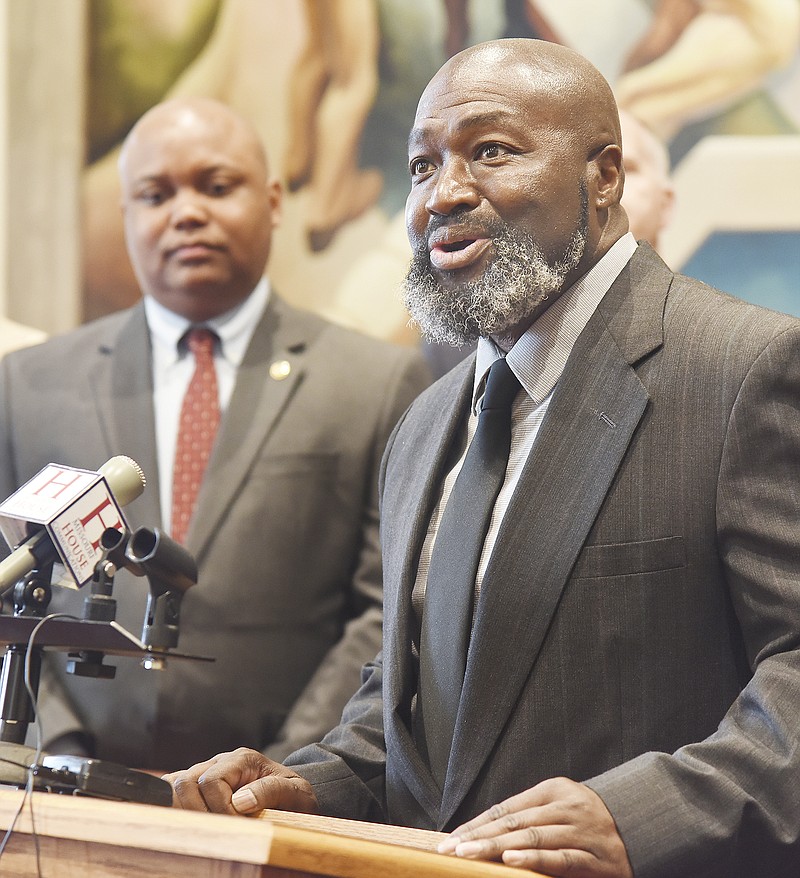Much like the First Step Act, legislation Missouri lawmakers are contemplating can reduce the number of people incarcerated, ease over-harsh penalties and help offenders re-integrate into society.
Speaking to reporters in the Missouri House of Representatives Lounge during a news conference announcing an omnibus justice reform bill, Matthew Charles said he's very excited about what Missouri lawmakers are considering.
The Nashville, Tennessee, man who early this year became the first prisoner released from federal prison under the First Step Act, which gives nonviolent drug offenders a chance at freedom, was a featured guest of President Donald Trump during the 2019 State of the Union Address.
The Formerly Incarcerated Reenter Society Transformed Safely Transitioning Every Person Act (First Step) passed through Congress in December and was signed into law Dec. 21. The act restricts use of restraints on pregnant women, expands compassionate release for terminally ill patients and places prisoners closer to families in some cases. It increased how much good conduct time prisoners could earn annually and provided for recidivism-reduction programming for felons.
"I was sentenced to 35 years in 1995 for a nonviolent drug offense," Charles said. "Before I entered federal prison, I became a Christian. That decision caused me to live a different lifestyle."
"During my 21 years that I actually served in prison, I did it without any disciplinary actions or infractions," Charles said. "That meant that I was, in fact, rehabilitated."
Following reductions in federal sentencing guidelines concerning cocaine, Charles said, he filed a petition for release and in 2016 it was granted.
He was released from prison, got a job and an apartment, and joined a church.
However, the federal government appealed the decision, and he went back to prison for about two years.
A National Public Radio reporter heard about Charles and published his story in "He rebuilt his life, only to be sent back to prison."
After passage of First Step, he was again freed.
"My case showed why people needed a second chance and why the First Step Act was instrumental and needed to be passed," he said. "And I'm very excited about what the state of Missouri is doing."
The General Assembly is considering numerous bills aimed at meeting one of Gov. Mike Parson's priorities - criminal justice reform - said state Rep. Shamed Dogan, R-Ballwin, chairman of the Special Committee on Criminal Justice.
"We as a committee are going to be introducing what we're calling the Missouri First Step Act later this week," Dogan said. "That is going to be a comprehensive criminal justice reform package."
House Committee Bill 2 will include mandatory minimum sentencing language found in House and Senate bills this year, which would allow courts to depart from the state's minimum-sentencing guidelines. The bills let courts consider the history and character of the defendant - and that person's chances for rehabilitation - when pronouncing a sentence.
The committee bill also includes (like the federal act) the provision of free feminine hygiene products for incarcerated women and a ban on maternal shackling, from bills sponsored by state Rep. Mary Elizabeth Coleman, R-Arnold.
The omnibus will also include "Missouri-specific reforms," Dogan said. It would authorize the early parole of certain offenders who are 65 or older and who are serving sentences of 50 years or more. If the offender had no previous violent offenses and had not been convicted of a sexual offense, he or she would be eligible for parole after 30 years. The Parole Board would be required to determine whether there is a reasonable probability the offender will not violate the law again upon release.
It would eliminate the practice of jailing people who owe counties for room and board assessed during incarceration. Dogan described the practice as "debtors' prison."
It also would give felons the opportunity to work in restaurants and grocery or convenience stores that sell alcohol or lottery tickets.
State Rep. Cheri Toalson Reisch, R-Hallsville, said Boone County has a 1.5 percent unemployment rate, with too few workers to fill openings. Preventing felons from working at the establishments eliminates a significant part of the workforce available to those businesses.
Supporters of the changes to Missouri law are very excited about them because they allow judges to consider more factors before pronouncing sentences on offenders.
"The House Committee Bill process was introduced a few years ago to allow committees to introduce legislation on their own," Dogan said. "When you do omnibus legislation like this, it gives us one more pathway for some of these good bills to get through."

